International Political Economy: Economic Cooperation and the WTO
VerifiedAdded on 2023/04/08
|17
|3278
|368
Essay
AI Summary
This essay provides an overview of economic cooperation within the context of International Political Economy (IPE), focusing on the World Trade Organization (WTO). It highlights the achievements of the WTO while also examining the challenges it currently faces, such as the lack of consensus in decision-making, the selective application of rules, and the rise of alternative economic powers like BRICS. The essay discusses how economic cooperation leads to various benefits, including trade, social, and political advantages, and how globalization necessitates international trade relations. It further analyzes the impact of regional trade blocs, the importance of consensus in the WTO, and the effects of differential treatment among member states. The conclusion emphasizes the need for the WTO to address its internal issues to regain the confidence of the global community and maintain its relevance in international trade.
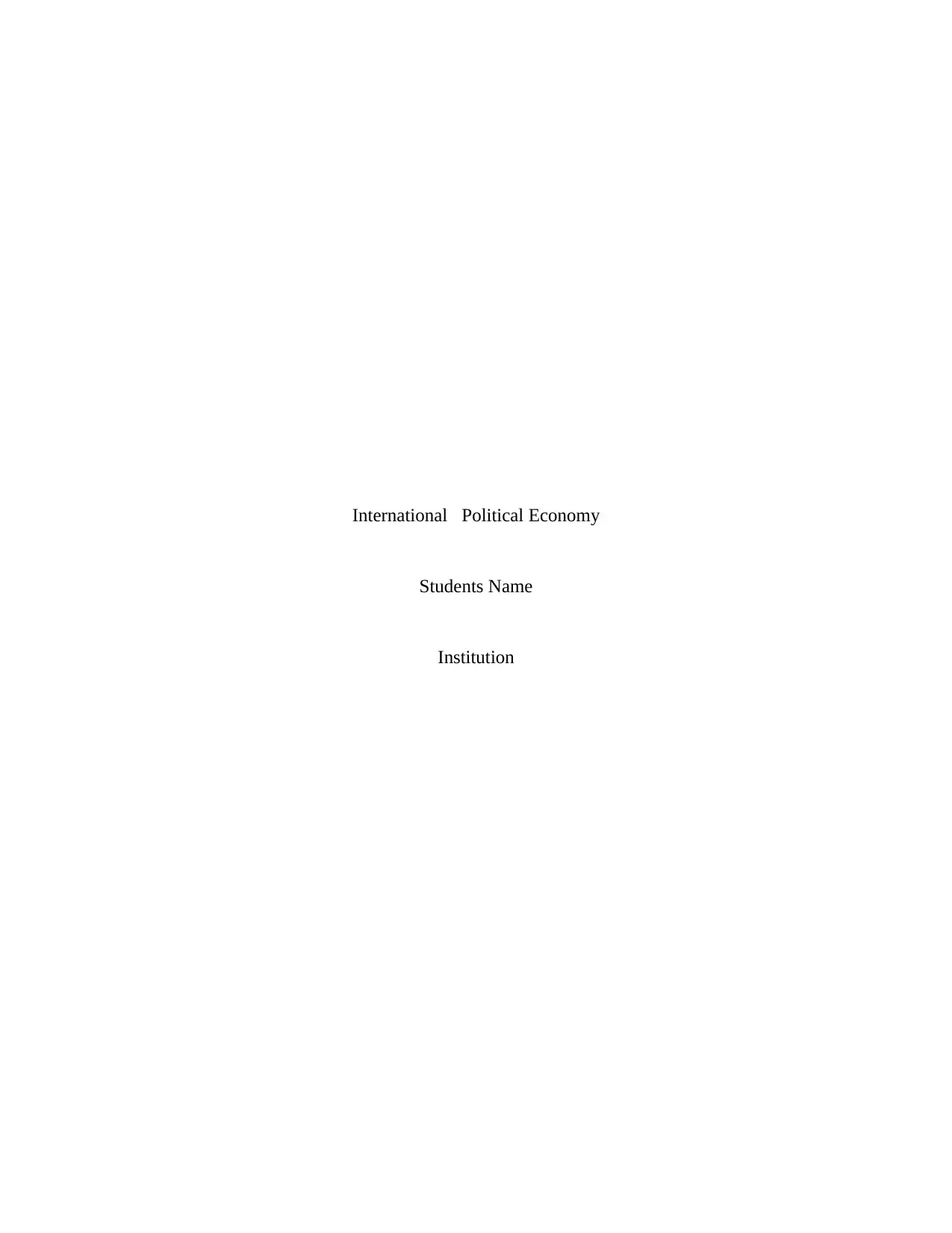
International Political Economy
Students Name
Institution
Students Name
Institution
Paraphrase This Document
Need a fresh take? Get an instant paraphrase of this document with our AI Paraphraser
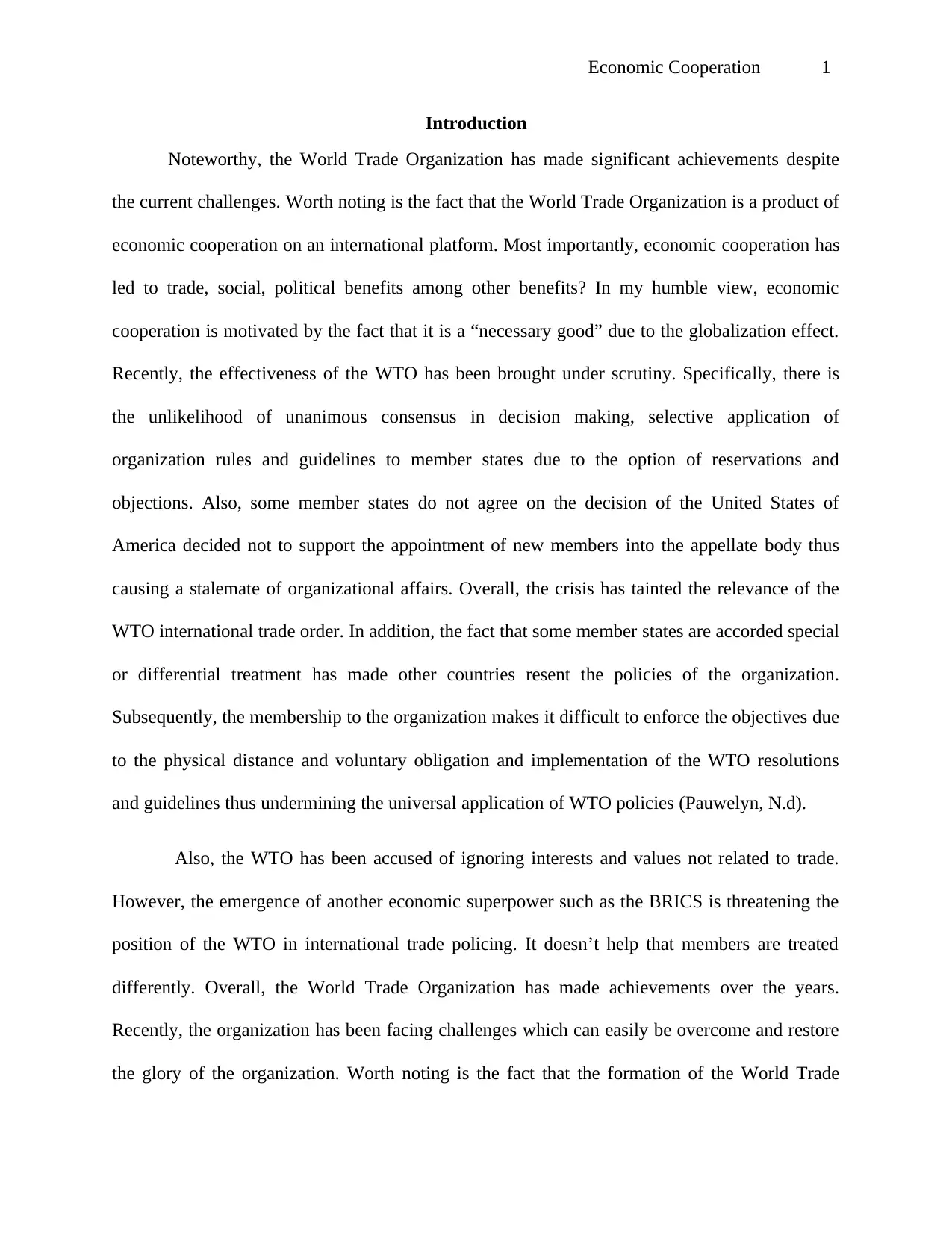
Economic Cooperation 1
Introduction
Noteworthy, the World Trade Organization has made significant achievements despite
the current challenges. Worth noting is the fact that the World Trade Organization is a product of
economic cooperation on an international platform. Most importantly, economic cooperation has
led to trade, social, political benefits among other benefits? In my humble view, economic
cooperation is motivated by the fact that it is a “necessary good” due to the globalization effect.
Recently, the effectiveness of the WTO has been brought under scrutiny. Specifically, there is
the unlikelihood of unanimous consensus in decision making, selective application of
organization rules and guidelines to member states due to the option of reservations and
objections. Also, some member states do not agree on the decision of the United States of
America decided not to support the appointment of new members into the appellate body thus
causing a stalemate of organizational affairs. Overall, the crisis has tainted the relevance of the
WTO international trade order. In addition, the fact that some member states are accorded special
or differential treatment has made other countries resent the policies of the organization.
Subsequently, the membership to the organization makes it difficult to enforce the objectives due
to the physical distance and voluntary obligation and implementation of the WTO resolutions
and guidelines thus undermining the universal application of WTO policies (Pauwelyn, N.d).
Also, the WTO has been accused of ignoring interests and values not related to trade.
However, the emergence of another economic superpower such as the BRICS is threatening the
position of the WTO in international trade policing. It doesn’t help that members are treated
differently. Overall, the World Trade Organization has made achievements over the years.
Recently, the organization has been facing challenges which can easily be overcome and restore
the glory of the organization. Worth noting is the fact that the formation of the World Trade
Introduction
Noteworthy, the World Trade Organization has made significant achievements despite
the current challenges. Worth noting is the fact that the World Trade Organization is a product of
economic cooperation on an international platform. Most importantly, economic cooperation has
led to trade, social, political benefits among other benefits? In my humble view, economic
cooperation is motivated by the fact that it is a “necessary good” due to the globalization effect.
Recently, the effectiveness of the WTO has been brought under scrutiny. Specifically, there is
the unlikelihood of unanimous consensus in decision making, selective application of
organization rules and guidelines to member states due to the option of reservations and
objections. Also, some member states do not agree on the decision of the United States of
America decided not to support the appointment of new members into the appellate body thus
causing a stalemate of organizational affairs. Overall, the crisis has tainted the relevance of the
WTO international trade order. In addition, the fact that some member states are accorded special
or differential treatment has made other countries resent the policies of the organization.
Subsequently, the membership to the organization makes it difficult to enforce the objectives due
to the physical distance and voluntary obligation and implementation of the WTO resolutions
and guidelines thus undermining the universal application of WTO policies (Pauwelyn, N.d).
Also, the WTO has been accused of ignoring interests and values not related to trade.
However, the emergence of another economic superpower such as the BRICS is threatening the
position of the WTO in international trade policing. It doesn’t help that members are treated
differently. Overall, the World Trade Organization has made achievements over the years.
Recently, the organization has been facing challenges which can easily be overcome and restore
the glory of the organization. Worth noting is the fact that the formation of the World Trade
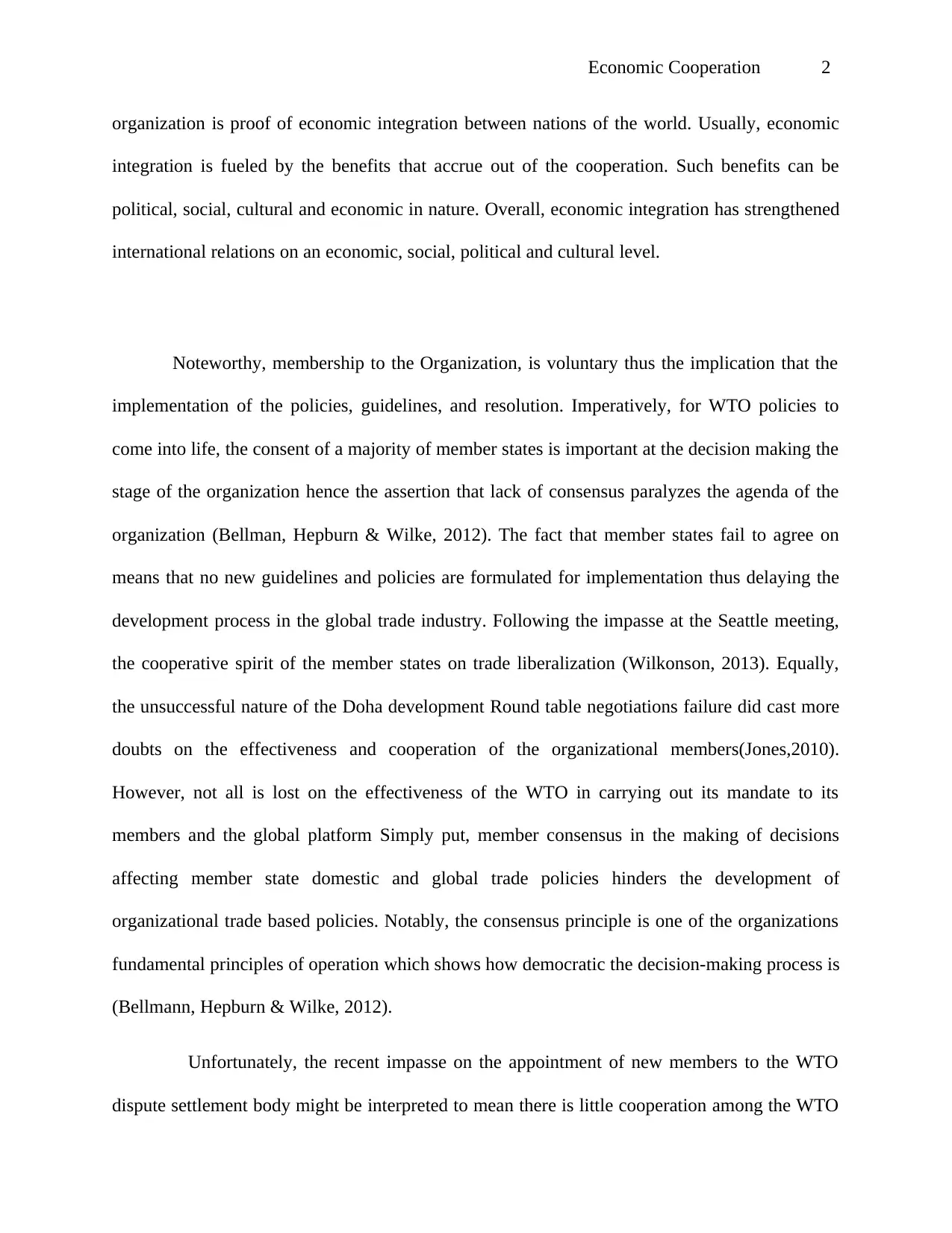
Economic Cooperation 2
organization is proof of economic integration between nations of the world. Usually, economic
integration is fueled by the benefits that accrue out of the cooperation. Such benefits can be
political, social, cultural and economic in nature. Overall, economic integration has strengthened
international relations on an economic, social, political and cultural level.
Noteworthy, membership to the Organization, is voluntary thus the implication that the
implementation of the policies, guidelines, and resolution. Imperatively, for WTO policies to
come into life, the consent of a majority of member states is important at the decision making the
stage of the organization hence the assertion that lack of consensus paralyzes the agenda of the
organization (Bellman, Hepburn & Wilke, 2012). The fact that member states fail to agree on
means that no new guidelines and policies are formulated for implementation thus delaying the
development process in the global trade industry. Following the impasse at the Seattle meeting,
the cooperative spirit of the member states on trade liberalization (Wilkonson, 2013). Equally,
the unsuccessful nature of the Doha development Round table negotiations failure did cast more
doubts on the effectiveness and cooperation of the organizational members(Jones,2010).
However, not all is lost on the effectiveness of the WTO in carrying out its mandate to its
members and the global platform Simply put, member consensus in the making of decisions
affecting member state domestic and global trade policies hinders the development of
organizational trade based policies. Notably, the consensus principle is one of the organizations
fundamental principles of operation which shows how democratic the decision-making process is
(Bellmann, Hepburn & Wilke, 2012).
Unfortunately, the recent impasse on the appointment of new members to the WTO
dispute settlement body might be interpreted to mean there is little cooperation among the WTO
organization is proof of economic integration between nations of the world. Usually, economic
integration is fueled by the benefits that accrue out of the cooperation. Such benefits can be
political, social, cultural and economic in nature. Overall, economic integration has strengthened
international relations on an economic, social, political and cultural level.
Noteworthy, membership to the Organization, is voluntary thus the implication that the
implementation of the policies, guidelines, and resolution. Imperatively, for WTO policies to
come into life, the consent of a majority of member states is important at the decision making the
stage of the organization hence the assertion that lack of consensus paralyzes the agenda of the
organization (Bellman, Hepburn & Wilke, 2012). The fact that member states fail to agree on
means that no new guidelines and policies are formulated for implementation thus delaying the
development process in the global trade industry. Following the impasse at the Seattle meeting,
the cooperative spirit of the member states on trade liberalization (Wilkonson, 2013). Equally,
the unsuccessful nature of the Doha development Round table negotiations failure did cast more
doubts on the effectiveness and cooperation of the organizational members(Jones,2010).
However, not all is lost on the effectiveness of the WTO in carrying out its mandate to its
members and the global platform Simply put, member consensus in the making of decisions
affecting member state domestic and global trade policies hinders the development of
organizational trade based policies. Notably, the consensus principle is one of the organizations
fundamental principles of operation which shows how democratic the decision-making process is
(Bellmann, Hepburn & Wilke, 2012).
Unfortunately, the recent impasse on the appointment of new members to the WTO
dispute settlement body might be interpreted to mean there is little cooperation among the WTO
⊘ This is a preview!⊘
Do you want full access?
Subscribe today to unlock all pages.

Trusted by 1+ million students worldwide
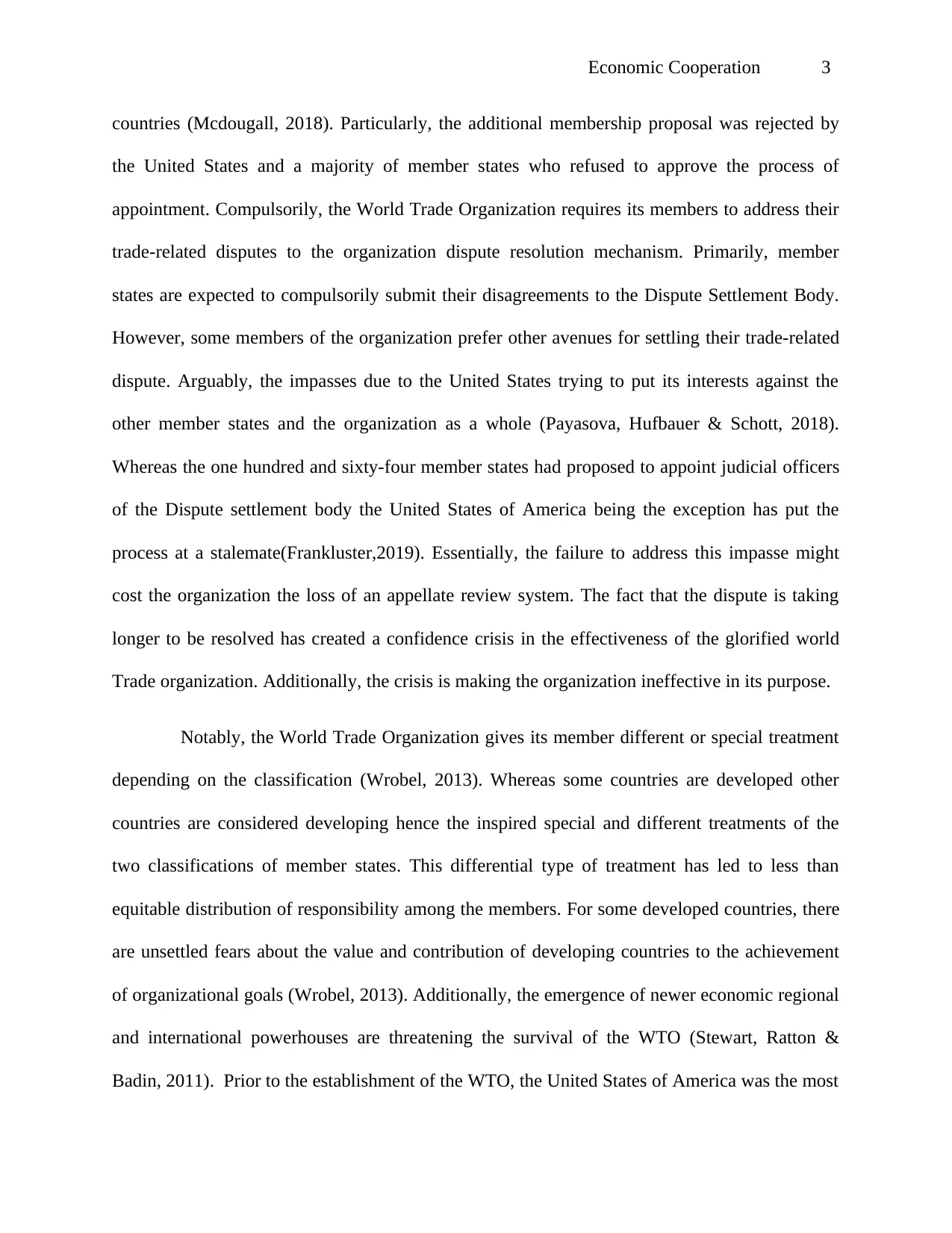
Economic Cooperation 3
countries (Mcdougall, 2018). Particularly, the additional membership proposal was rejected by
the United States and a majority of member states who refused to approve the process of
appointment. Compulsorily, the World Trade Organization requires its members to address their
trade-related disputes to the organization dispute resolution mechanism. Primarily, member
states are expected to compulsorily submit their disagreements to the Dispute Settlement Body.
However, some members of the organization prefer other avenues for settling their trade-related
dispute. Arguably, the impasses due to the United States trying to put its interests against the
other member states and the organization as a whole (Payasova, Hufbauer & Schott, 2018).
Whereas the one hundred and sixty-four member states had proposed to appoint judicial officers
of the Dispute settlement body the United States of America being the exception has put the
process at a stalemate(Frankluster,2019). Essentially, the failure to address this impasse might
cost the organization the loss of an appellate review system. The fact that the dispute is taking
longer to be resolved has created a confidence crisis in the effectiveness of the glorified world
Trade organization. Additionally, the crisis is making the organization ineffective in its purpose.
Notably, the World Trade Organization gives its member different or special treatment
depending on the classification (Wrobel, 2013). Whereas some countries are developed other
countries are considered developing hence the inspired special and different treatments of the
two classifications of member states. This differential type of treatment has led to less than
equitable distribution of responsibility among the members. For some developed countries, there
are unsettled fears about the value and contribution of developing countries to the achievement
of organizational goals (Wrobel, 2013). Additionally, the emergence of newer economic regional
and international powerhouses are threatening the survival of the WTO (Stewart, Ratton &
Badin, 2011). Prior to the establishment of the WTO, the United States of America was the most
countries (Mcdougall, 2018). Particularly, the additional membership proposal was rejected by
the United States and a majority of member states who refused to approve the process of
appointment. Compulsorily, the World Trade Organization requires its members to address their
trade-related disputes to the organization dispute resolution mechanism. Primarily, member
states are expected to compulsorily submit their disagreements to the Dispute Settlement Body.
However, some members of the organization prefer other avenues for settling their trade-related
dispute. Arguably, the impasses due to the United States trying to put its interests against the
other member states and the organization as a whole (Payasova, Hufbauer & Schott, 2018).
Whereas the one hundred and sixty-four member states had proposed to appoint judicial officers
of the Dispute settlement body the United States of America being the exception has put the
process at a stalemate(Frankluster,2019). Essentially, the failure to address this impasse might
cost the organization the loss of an appellate review system. The fact that the dispute is taking
longer to be resolved has created a confidence crisis in the effectiveness of the glorified world
Trade organization. Additionally, the crisis is making the organization ineffective in its purpose.
Notably, the World Trade Organization gives its member different or special treatment
depending on the classification (Wrobel, 2013). Whereas some countries are developed other
countries are considered developing hence the inspired special and different treatments of the
two classifications of member states. This differential type of treatment has led to less than
equitable distribution of responsibility among the members. For some developed countries, there
are unsettled fears about the value and contribution of developing countries to the achievement
of organizational goals (Wrobel, 2013). Additionally, the emergence of newer economic regional
and international powerhouses are threatening the survival of the WTO (Stewart, Ratton &
Badin, 2011). Prior to the establishment of the WTO, the United States of America was the most
Paraphrase This Document
Need a fresh take? Get an instant paraphrase of this document with our AI Paraphraser
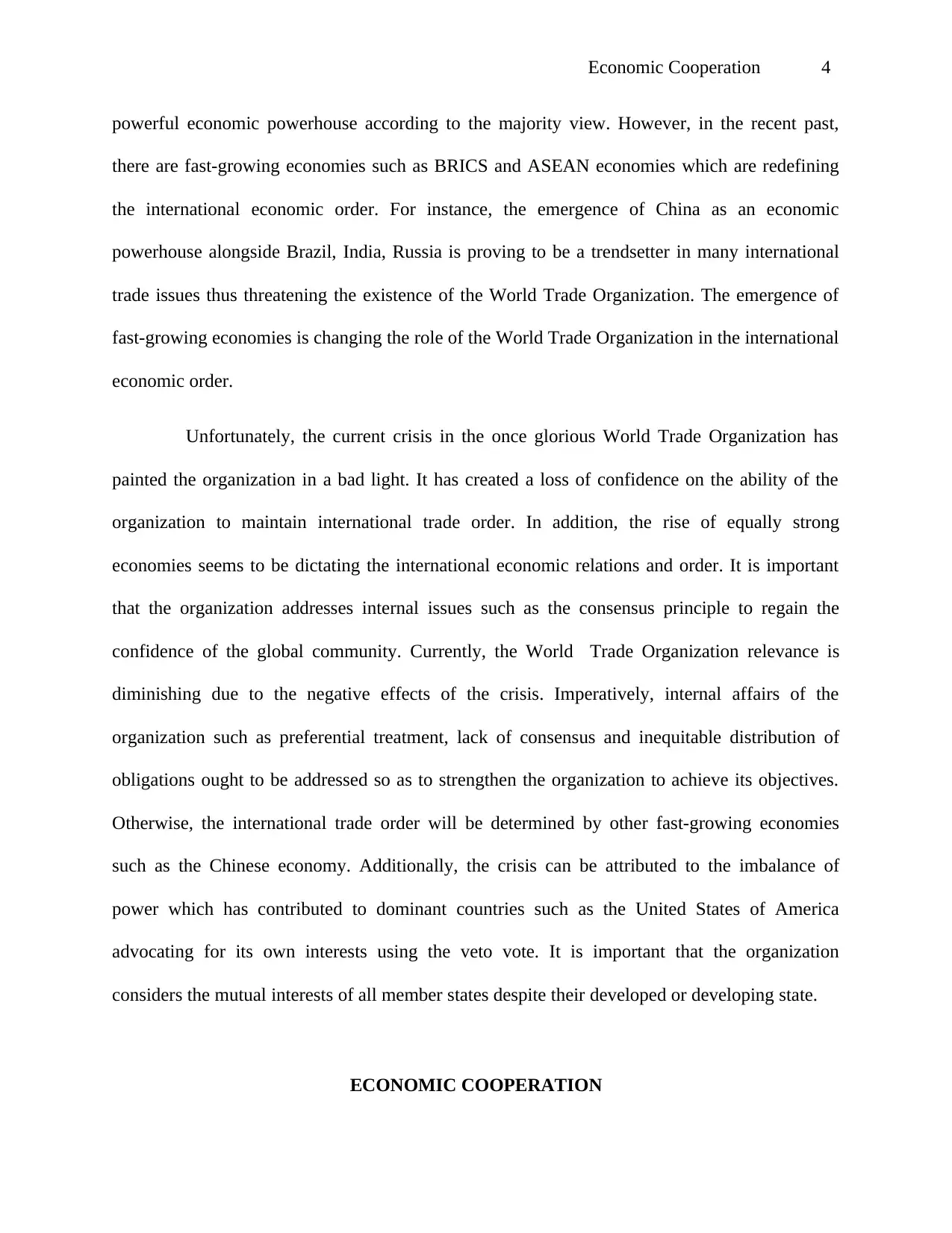
Economic Cooperation 4
powerful economic powerhouse according to the majority view. However, in the recent past,
there are fast-growing economies such as BRICS and ASEAN economies which are redefining
the international economic order. For instance, the emergence of China as an economic
powerhouse alongside Brazil, India, Russia is proving to be a trendsetter in many international
trade issues thus threatening the existence of the World Trade Organization. The emergence of
fast-growing economies is changing the role of the World Trade Organization in the international
economic order.
Unfortunately, the current crisis in the once glorious World Trade Organization has
painted the organization in a bad light. It has created a loss of confidence on the ability of the
organization to maintain international trade order. In addition, the rise of equally strong
economies seems to be dictating the international economic relations and order. It is important
that the organization addresses internal issues such as the consensus principle to regain the
confidence of the global community. Currently, the World Trade Organization relevance is
diminishing due to the negative effects of the crisis. Imperatively, internal affairs of the
organization such as preferential treatment, lack of consensus and inequitable distribution of
obligations ought to be addressed so as to strengthen the organization to achieve its objectives.
Otherwise, the international trade order will be determined by other fast-growing economies
such as the Chinese economy. Additionally, the crisis can be attributed to the imbalance of
power which has contributed to dominant countries such as the United States of America
advocating for its own interests using the veto vote. It is important that the organization
considers the mutual interests of all member states despite their developed or developing state.
ECONOMIC COOPERATION
powerful economic powerhouse according to the majority view. However, in the recent past,
there are fast-growing economies such as BRICS and ASEAN economies which are redefining
the international economic order. For instance, the emergence of China as an economic
powerhouse alongside Brazil, India, Russia is proving to be a trendsetter in many international
trade issues thus threatening the existence of the World Trade Organization. The emergence of
fast-growing economies is changing the role of the World Trade Organization in the international
economic order.
Unfortunately, the current crisis in the once glorious World Trade Organization has
painted the organization in a bad light. It has created a loss of confidence on the ability of the
organization to maintain international trade order. In addition, the rise of equally strong
economies seems to be dictating the international economic relations and order. It is important
that the organization addresses internal issues such as the consensus principle to regain the
confidence of the global community. Currently, the World Trade Organization relevance is
diminishing due to the negative effects of the crisis. Imperatively, internal affairs of the
organization such as preferential treatment, lack of consensus and inequitable distribution of
obligations ought to be addressed so as to strengthen the organization to achieve its objectives.
Otherwise, the international trade order will be determined by other fast-growing economies
such as the Chinese economy. Additionally, the crisis can be attributed to the imbalance of
power which has contributed to dominant countries such as the United States of America
advocating for its own interests using the veto vote. It is important that the organization
considers the mutual interests of all member states despite their developed or developing state.
ECONOMIC COOPERATION
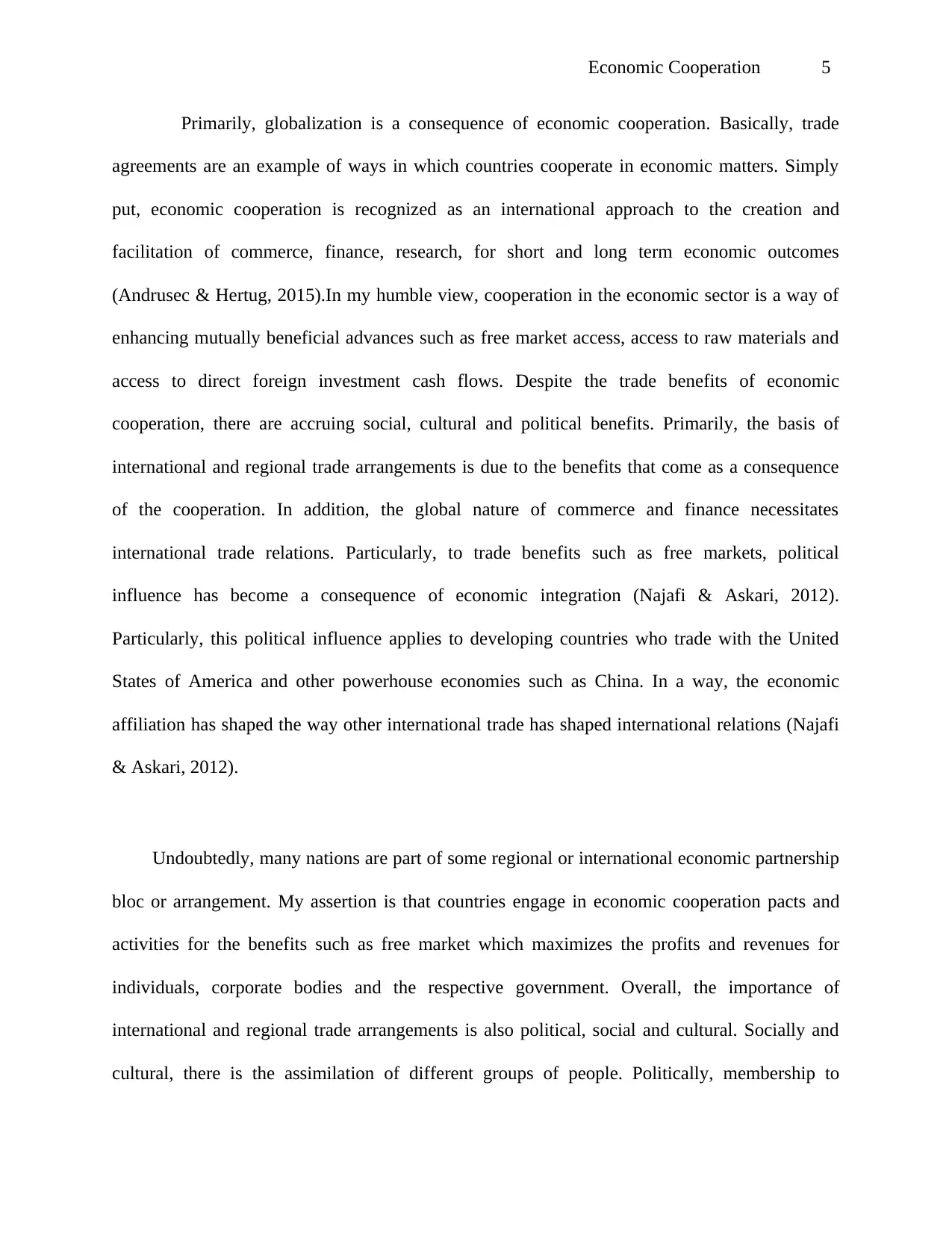
Economic Cooperation 5
Primarily, globalization is a consequence of economic cooperation. Basically, trade
agreements are an example of ways in which countries cooperate in economic matters. Simply
put, economic cooperation is recognized as an international approach to the creation and
facilitation of commerce, finance, research, for short and long term economic outcomes
(Andrusec & Hertug, 2015).In my humble view, cooperation in the economic sector is a way of
enhancing mutually beneficial advances such as free market access, access to raw materials and
access to direct foreign investment cash flows. Despite the trade benefits of economic
cooperation, there are accruing social, cultural and political benefits. Primarily, the basis of
international and regional trade arrangements is due to the benefits that come as a consequence
of the cooperation. In addition, the global nature of commerce and finance necessitates
international trade relations. Particularly, to trade benefits such as free markets, political
influence has become a consequence of economic integration (Najafi & Askari, 2012).
Particularly, this political influence applies to developing countries who trade with the United
States of America and other powerhouse economies such as China. In a way, the economic
affiliation has shaped the way other international trade has shaped international relations (Najafi
& Askari, 2012).
Undoubtedly, many nations are part of some regional or international economic partnership
bloc or arrangement. My assertion is that countries engage in economic cooperation pacts and
activities for the benefits such as free market which maximizes the profits and revenues for
individuals, corporate bodies and the respective government. Overall, the importance of
international and regional trade arrangements is also political, social and cultural. Socially and
cultural, there is the assimilation of different groups of people. Politically, membership to
Primarily, globalization is a consequence of economic cooperation. Basically, trade
agreements are an example of ways in which countries cooperate in economic matters. Simply
put, economic cooperation is recognized as an international approach to the creation and
facilitation of commerce, finance, research, for short and long term economic outcomes
(Andrusec & Hertug, 2015).In my humble view, cooperation in the economic sector is a way of
enhancing mutually beneficial advances such as free market access, access to raw materials and
access to direct foreign investment cash flows. Despite the trade benefits of economic
cooperation, there are accruing social, cultural and political benefits. Primarily, the basis of
international and regional trade arrangements is due to the benefits that come as a consequence
of the cooperation. In addition, the global nature of commerce and finance necessitates
international trade relations. Particularly, to trade benefits such as free markets, political
influence has become a consequence of economic integration (Najafi & Askari, 2012).
Particularly, this political influence applies to developing countries who trade with the United
States of America and other powerhouse economies such as China. In a way, the economic
affiliation has shaped the way other international trade has shaped international relations (Najafi
& Askari, 2012).
Undoubtedly, many nations are part of some regional or international economic partnership
bloc or arrangement. My assertion is that countries engage in economic cooperation pacts and
activities for the benefits such as free market which maximizes the profits and revenues for
individuals, corporate bodies and the respective government. Overall, the importance of
international and regional trade arrangements is also political, social and cultural. Socially and
cultural, there is the assimilation of different groups of people. Politically, membership to
⊘ This is a preview!⊘
Do you want full access?
Subscribe today to unlock all pages.

Trusted by 1+ million students worldwide
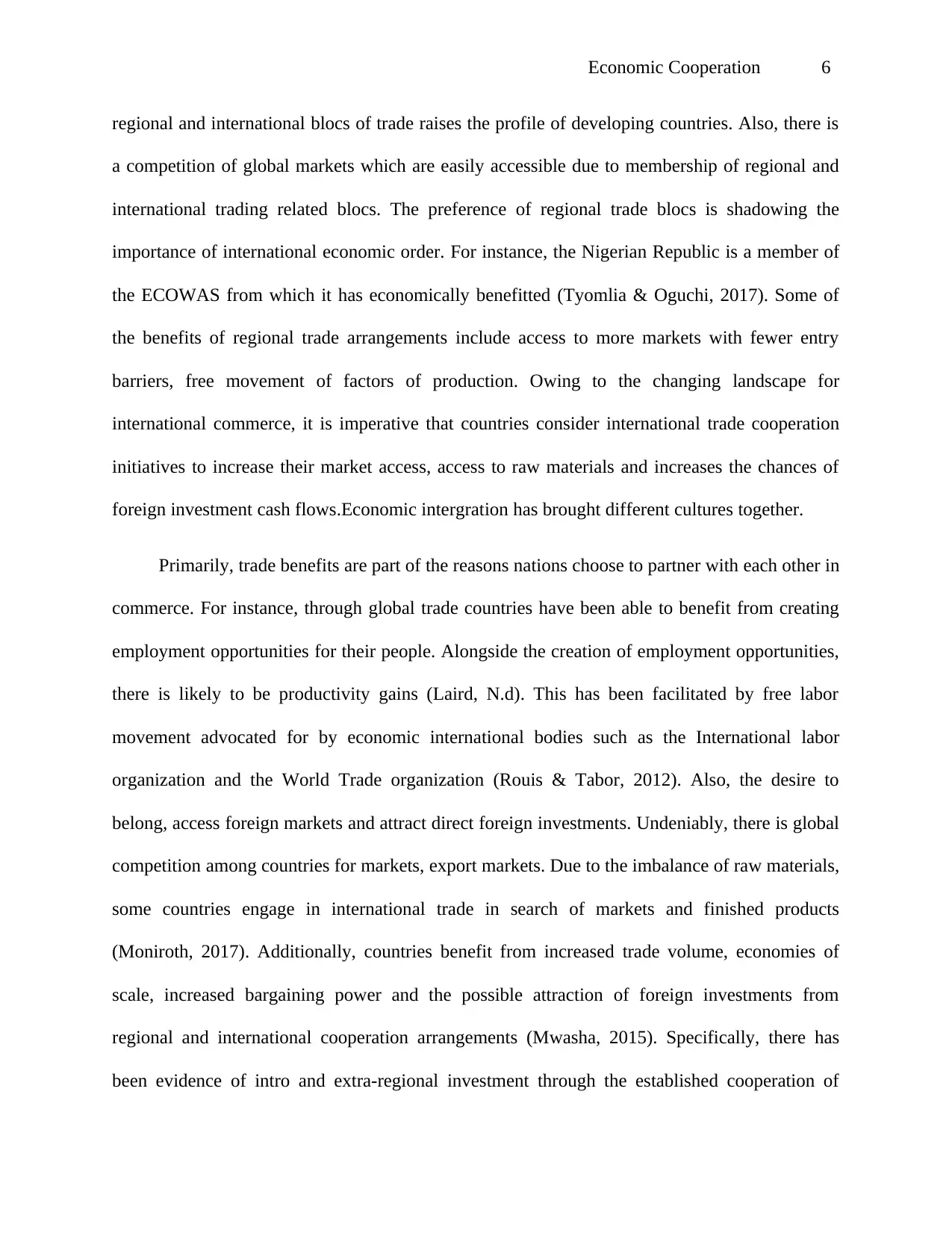
Economic Cooperation 6
regional and international blocs of trade raises the profile of developing countries. Also, there is
a competition of global markets which are easily accessible due to membership of regional and
international trading related blocs. The preference of regional trade blocs is shadowing the
importance of international economic order. For instance, the Nigerian Republic is a member of
the ECOWAS from which it has economically benefitted (Tyomlia & Oguchi, 2017). Some of
the benefits of regional trade arrangements include access to more markets with fewer entry
barriers, free movement of factors of production. Owing to the changing landscape for
international commerce, it is imperative that countries consider international trade cooperation
initiatives to increase their market access, access to raw materials and increases the chances of
foreign investment cash flows.Economic intergration has brought different cultures together.
Primarily, trade benefits are part of the reasons nations choose to partner with each other in
commerce. For instance, through global trade countries have been able to benefit from creating
employment opportunities for their people. Alongside the creation of employment opportunities,
there is likely to be productivity gains (Laird, N.d). This has been facilitated by free labor
movement advocated for by economic international bodies such as the International labor
organization and the World Trade organization (Rouis & Tabor, 2012). Also, the desire to
belong, access foreign markets and attract direct foreign investments. Undeniably, there is global
competition among countries for markets, export markets. Due to the imbalance of raw materials,
some countries engage in international trade in search of markets and finished products
(Moniroth, 2017). Additionally, countries benefit from increased trade volume, economies of
scale, increased bargaining power and the possible attraction of foreign investments from
regional and international cooperation arrangements (Mwasha, 2015). Specifically, there has
been evidence of intro and extra-regional investment through the established cooperation of
regional and international blocs of trade raises the profile of developing countries. Also, there is
a competition of global markets which are easily accessible due to membership of regional and
international trading related blocs. The preference of regional trade blocs is shadowing the
importance of international economic order. For instance, the Nigerian Republic is a member of
the ECOWAS from which it has economically benefitted (Tyomlia & Oguchi, 2017). Some of
the benefits of regional trade arrangements include access to more markets with fewer entry
barriers, free movement of factors of production. Owing to the changing landscape for
international commerce, it is imperative that countries consider international trade cooperation
initiatives to increase their market access, access to raw materials and increases the chances of
foreign investment cash flows.Economic intergration has brought different cultures together.
Primarily, trade benefits are part of the reasons nations choose to partner with each other in
commerce. For instance, through global trade countries have been able to benefit from creating
employment opportunities for their people. Alongside the creation of employment opportunities,
there is likely to be productivity gains (Laird, N.d). This has been facilitated by free labor
movement advocated for by economic international bodies such as the International labor
organization and the World Trade organization (Rouis & Tabor, 2012). Also, the desire to
belong, access foreign markets and attract direct foreign investments. Undeniably, there is global
competition among countries for markets, export markets. Due to the imbalance of raw materials,
some countries engage in international trade in search of markets and finished products
(Moniroth, 2017). Additionally, countries benefit from increased trade volume, economies of
scale, increased bargaining power and the possible attraction of foreign investments from
regional and international cooperation arrangements (Mwasha, 2015). Specifically, there has
been evidence of intro and extra-regional investment through the established cooperation of
Paraphrase This Document
Need a fresh take? Get an instant paraphrase of this document with our AI Paraphraser
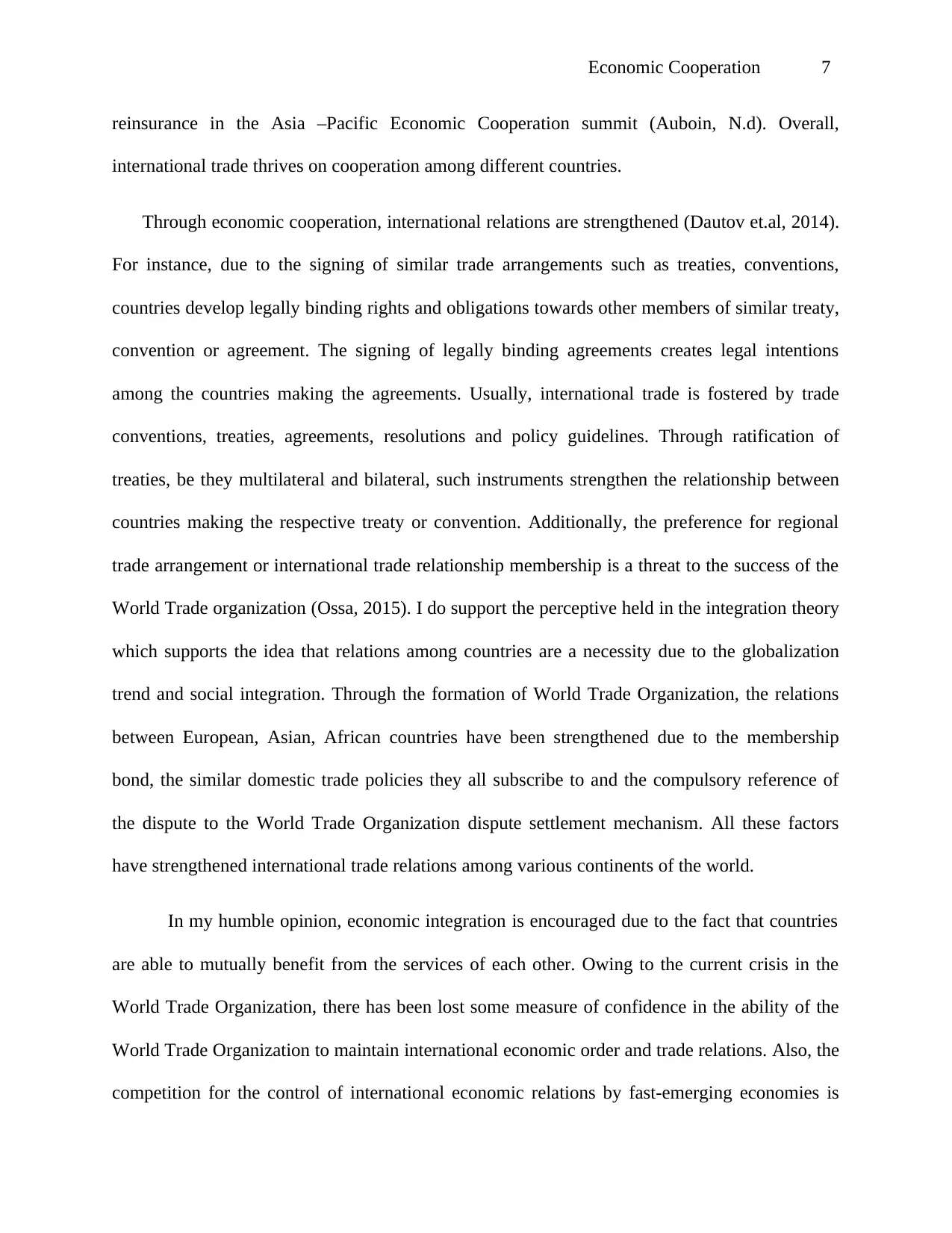
Economic Cooperation 7
reinsurance in the Asia –Pacific Economic Cooperation summit (Auboin, N.d). Overall,
international trade thrives on cooperation among different countries.
Through economic cooperation, international relations are strengthened (Dautov et.al, 2014).
For instance, due to the signing of similar trade arrangements such as treaties, conventions,
countries develop legally binding rights and obligations towards other members of similar treaty,
convention or agreement. The signing of legally binding agreements creates legal intentions
among the countries making the agreements. Usually, international trade is fostered by trade
conventions, treaties, agreements, resolutions and policy guidelines. Through ratification of
treaties, be they multilateral and bilateral, such instruments strengthen the relationship between
countries making the respective treaty or convention. Additionally, the preference for regional
trade arrangement or international trade relationship membership is a threat to the success of the
World Trade organization (Ossa, 2015). I do support the perceptive held in the integration theory
which supports the idea that relations among countries are a necessity due to the globalization
trend and social integration. Through the formation of World Trade Organization, the relations
between European, Asian, African countries have been strengthened due to the membership
bond, the similar domestic trade policies they all subscribe to and the compulsory reference of
the dispute to the World Trade Organization dispute settlement mechanism. All these factors
have strengthened international trade relations among various continents of the world.
In my humble opinion, economic integration is encouraged due to the fact that countries
are able to mutually benefit from the services of each other. Owing to the current crisis in the
World Trade Organization, there has been lost some measure of confidence in the ability of the
World Trade Organization to maintain international economic order and trade relations. Also, the
competition for the control of international economic relations by fast-emerging economies is
reinsurance in the Asia –Pacific Economic Cooperation summit (Auboin, N.d). Overall,
international trade thrives on cooperation among different countries.
Through economic cooperation, international relations are strengthened (Dautov et.al, 2014).
For instance, due to the signing of similar trade arrangements such as treaties, conventions,
countries develop legally binding rights and obligations towards other members of similar treaty,
convention or agreement. The signing of legally binding agreements creates legal intentions
among the countries making the agreements. Usually, international trade is fostered by trade
conventions, treaties, agreements, resolutions and policy guidelines. Through ratification of
treaties, be they multilateral and bilateral, such instruments strengthen the relationship between
countries making the respective treaty or convention. Additionally, the preference for regional
trade arrangement or international trade relationship membership is a threat to the success of the
World Trade organization (Ossa, 2015). I do support the perceptive held in the integration theory
which supports the idea that relations among countries are a necessity due to the globalization
trend and social integration. Through the formation of World Trade Organization, the relations
between European, Asian, African countries have been strengthened due to the membership
bond, the similar domestic trade policies they all subscribe to and the compulsory reference of
the dispute to the World Trade Organization dispute settlement mechanism. All these factors
have strengthened international trade relations among various continents of the world.
In my humble opinion, economic integration is encouraged due to the fact that countries
are able to mutually benefit from the services of each other. Owing to the current crisis in the
World Trade Organization, there has been lost some measure of confidence in the ability of the
World Trade Organization to maintain international economic order and trade relations. Also, the
competition for the control of international economic relations by fast-emerging economies is
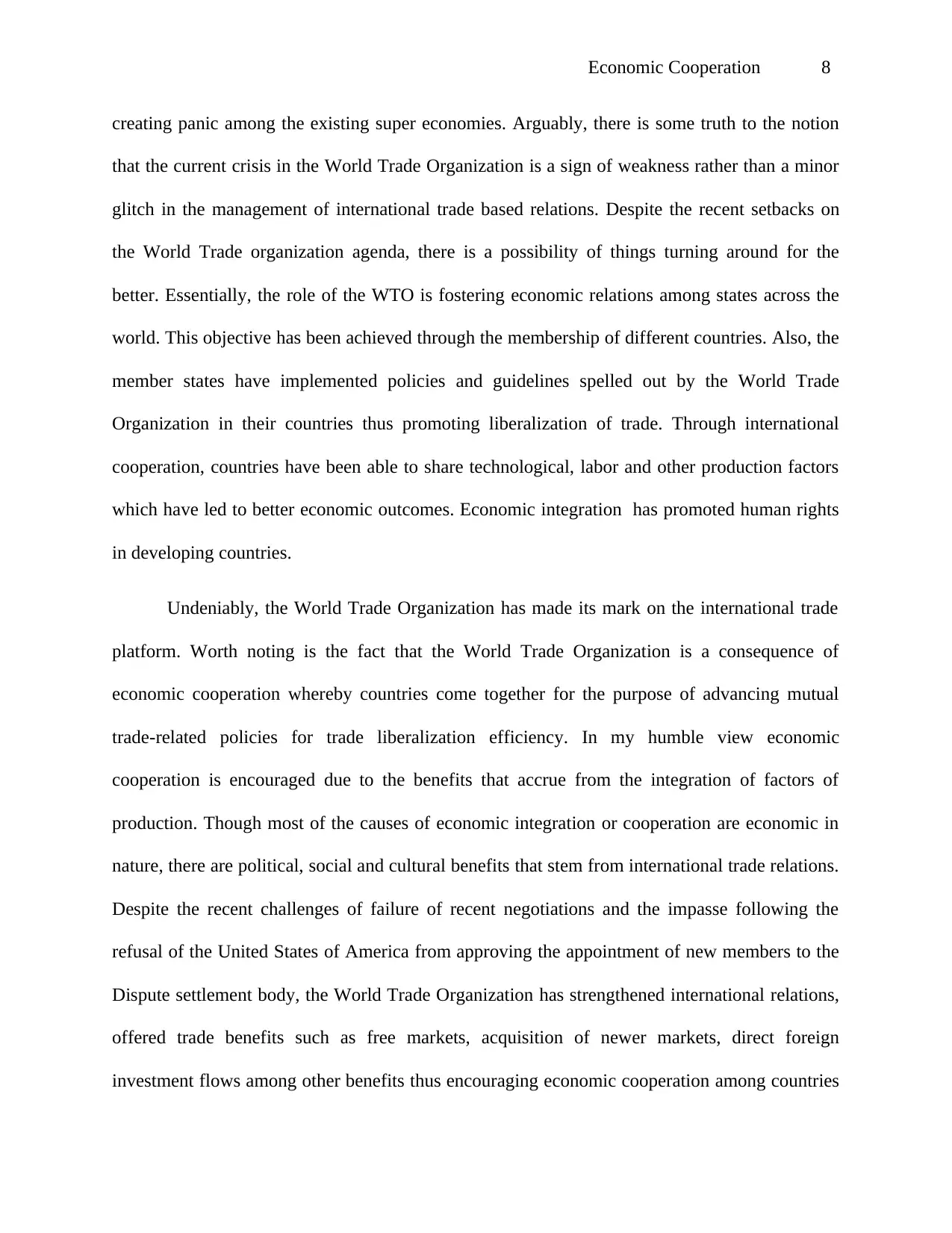
Economic Cooperation 8
creating panic among the existing super economies. Arguably, there is some truth to the notion
that the current crisis in the World Trade Organization is a sign of weakness rather than a minor
glitch in the management of international trade based relations. Despite the recent setbacks on
the World Trade organization agenda, there is a possibility of things turning around for the
better. Essentially, the role of the WTO is fostering economic relations among states across the
world. This objective has been achieved through the membership of different countries. Also, the
member states have implemented policies and guidelines spelled out by the World Trade
Organization in their countries thus promoting liberalization of trade. Through international
cooperation, countries have been able to share technological, labor and other production factors
which have led to better economic outcomes. Economic integration has promoted human rights
in developing countries.
Undeniably, the World Trade Organization has made its mark on the international trade
platform. Worth noting is the fact that the World Trade Organization is a consequence of
economic cooperation whereby countries come together for the purpose of advancing mutual
trade-related policies for trade liberalization efficiency. In my humble view economic
cooperation is encouraged due to the benefits that accrue from the integration of factors of
production. Though most of the causes of economic integration or cooperation are economic in
nature, there are political, social and cultural benefits that stem from international trade relations.
Despite the recent challenges of failure of recent negotiations and the impasse following the
refusal of the United States of America from approving the appointment of new members to the
Dispute settlement body, the World Trade Organization has strengthened international relations,
offered trade benefits such as free markets, acquisition of newer markets, direct foreign
investment flows among other benefits thus encouraging economic cooperation among countries
creating panic among the existing super economies. Arguably, there is some truth to the notion
that the current crisis in the World Trade Organization is a sign of weakness rather than a minor
glitch in the management of international trade based relations. Despite the recent setbacks on
the World Trade organization agenda, there is a possibility of things turning around for the
better. Essentially, the role of the WTO is fostering economic relations among states across the
world. This objective has been achieved through the membership of different countries. Also, the
member states have implemented policies and guidelines spelled out by the World Trade
Organization in their countries thus promoting liberalization of trade. Through international
cooperation, countries have been able to share technological, labor and other production factors
which have led to better economic outcomes. Economic integration has promoted human rights
in developing countries.
Undeniably, the World Trade Organization has made its mark on the international trade
platform. Worth noting is the fact that the World Trade Organization is a consequence of
economic cooperation whereby countries come together for the purpose of advancing mutual
trade-related policies for trade liberalization efficiency. In my humble view economic
cooperation is encouraged due to the benefits that accrue from the integration of factors of
production. Though most of the causes of economic integration or cooperation are economic in
nature, there are political, social and cultural benefits that stem from international trade relations.
Despite the recent challenges of failure of recent negotiations and the impasse following the
refusal of the United States of America from approving the appointment of new members to the
Dispute settlement body, the World Trade Organization has strengthened international relations,
offered trade benefits such as free markets, acquisition of newer markets, direct foreign
investment flows among other benefits thus encouraging economic cooperation among countries
⊘ This is a preview!⊘
Do you want full access?
Subscribe today to unlock all pages.

Trusted by 1+ million students worldwide
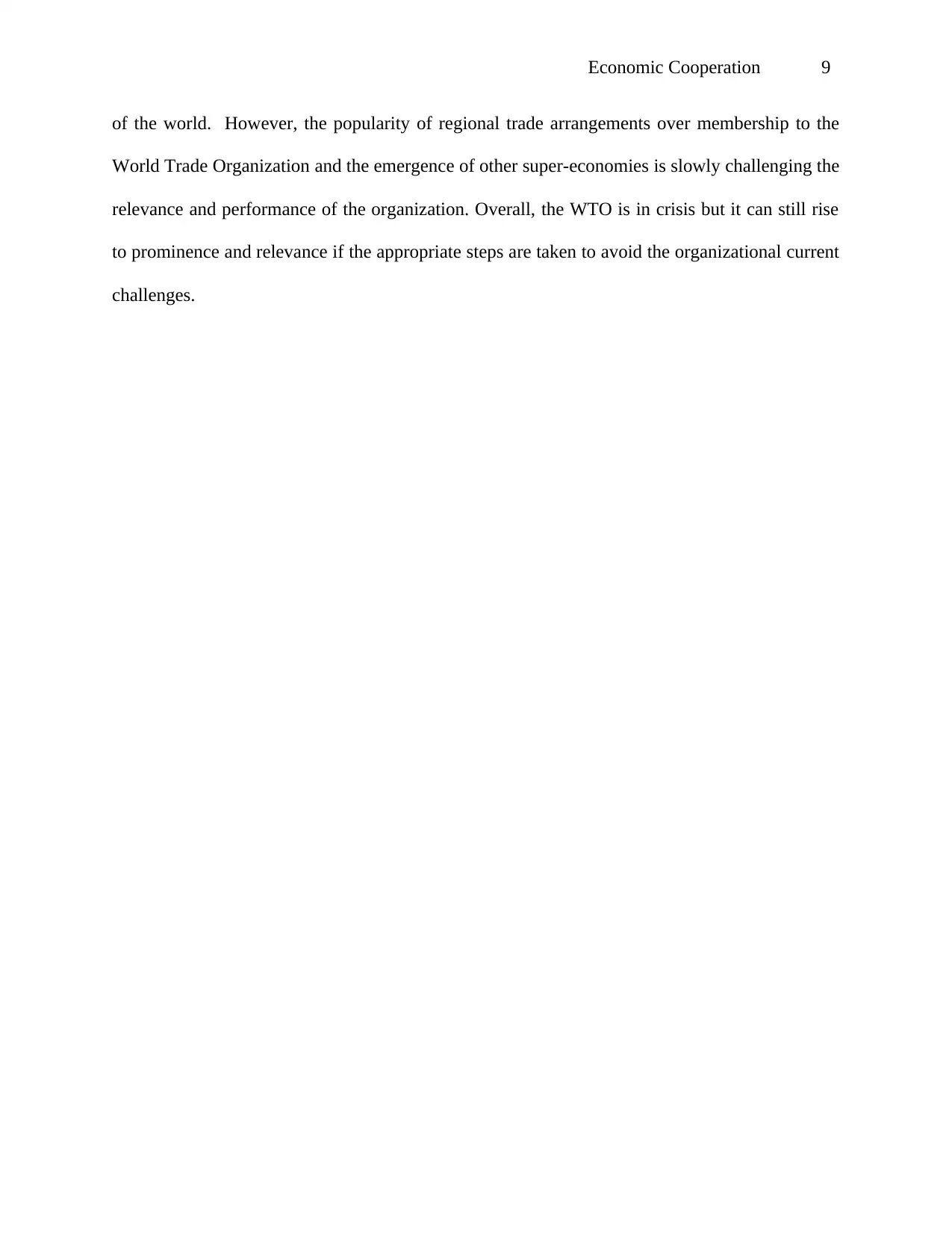
Economic Cooperation 9
of the world. However, the popularity of regional trade arrangements over membership to the
World Trade Organization and the emergence of other super-economies is slowly challenging the
relevance and performance of the organization. Overall, the WTO is in crisis but it can still rise
to prominence and relevance if the appropriate steps are taken to avoid the organizational current
challenges.
of the world. However, the popularity of regional trade arrangements over membership to the
World Trade Organization and the emergence of other super-economies is slowly challenging the
relevance and performance of the organization. Overall, the WTO is in crisis but it can still rise
to prominence and relevance if the appropriate steps are taken to avoid the organizational current
challenges.
Paraphrase This Document
Need a fresh take? Get an instant paraphrase of this document with our AI Paraphraser
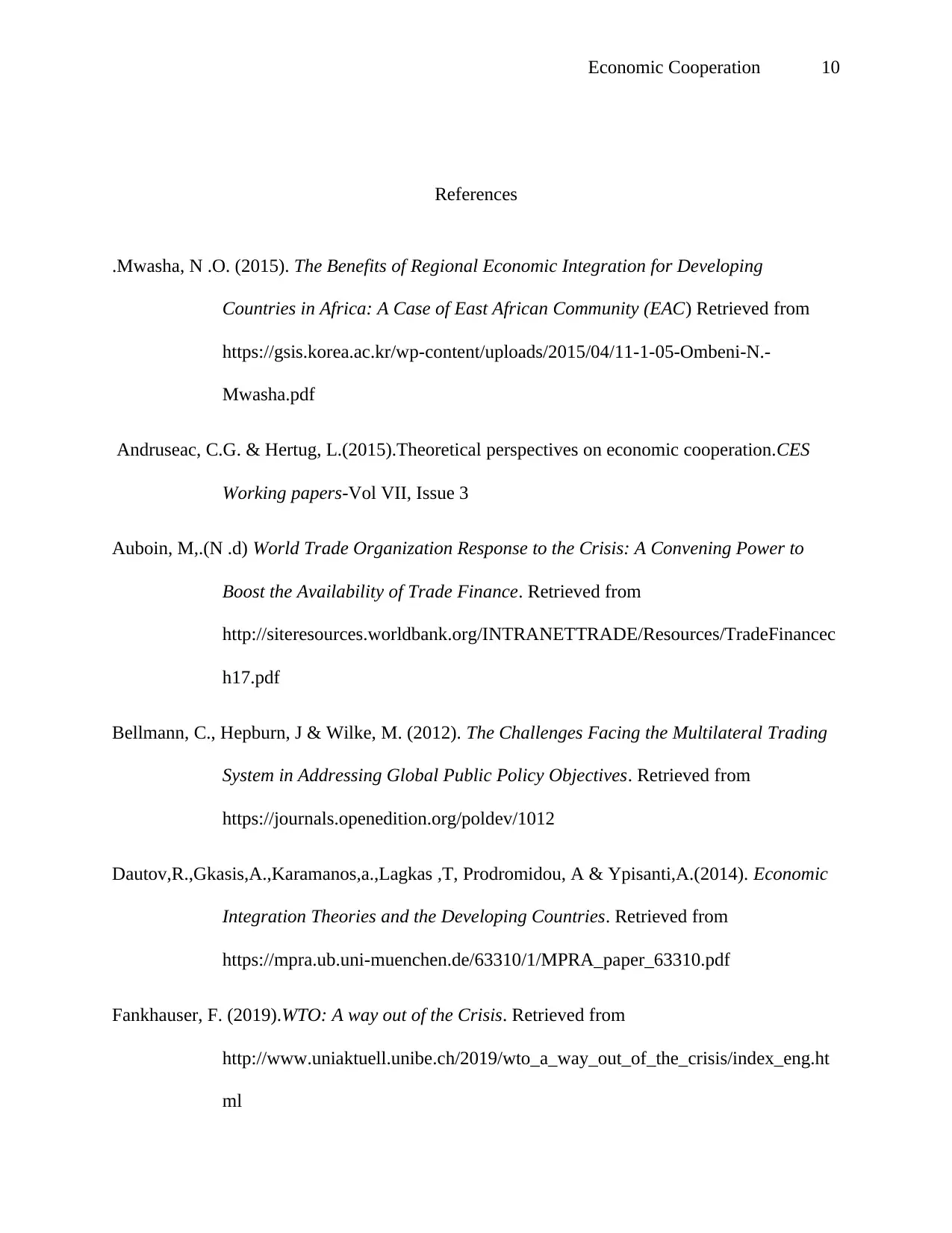
Economic Cooperation 10
References
.Mwasha, N .O. (2015). The Benefits of Regional Economic Integration for Developing
Countries in Africa: A Case of East African Community (EAC) Retrieved from
https://gsis.korea.ac.kr/wp-content/uploads/2015/04/11-1-05-Ombeni-N.-
Mwasha.pdf
Andruseac, C.G. & Hertug, L.(2015).Theoretical perspectives on economic cooperation.CES
Working papers-Vol VII, Issue 3
Auboin, M,.(N .d) World Trade Organization Response to the Crisis: A Convening Power to
Boost the Availability of Trade Finance. Retrieved from
http://siteresources.worldbank.org/INTRANETTRADE/Resources/TradeFinancec
h17.pdf
Bellmann, C., Hepburn, J & Wilke, M. (2012). The Challenges Facing the Multilateral Trading
System in Addressing Global Public Policy Objectives. Retrieved from
https://journals.openedition.org/poldev/1012
Dautov,R.,Gkasis,A.,Karamanos,a.,Lagkas ,T, Prodromidou, A & Ypisanti,A.(2014). Economic
Integration Theories and the Developing Countries. Retrieved from
https://mpra.ub.uni-muenchen.de/63310/1/MPRA_paper_63310.pdf
Fankhauser, F. (2019).WTO: A way out of the Crisis. Retrieved from
http://www.uniaktuell.unibe.ch/2019/wto_a_way_out_of_the_crisis/index_eng.ht
ml
References
.Mwasha, N .O. (2015). The Benefits of Regional Economic Integration for Developing
Countries in Africa: A Case of East African Community (EAC) Retrieved from
https://gsis.korea.ac.kr/wp-content/uploads/2015/04/11-1-05-Ombeni-N.-
Mwasha.pdf
Andruseac, C.G. & Hertug, L.(2015).Theoretical perspectives on economic cooperation.CES
Working papers-Vol VII, Issue 3
Auboin, M,.(N .d) World Trade Organization Response to the Crisis: A Convening Power to
Boost the Availability of Trade Finance. Retrieved from
http://siteresources.worldbank.org/INTRANETTRADE/Resources/TradeFinancec
h17.pdf
Bellmann, C., Hepburn, J & Wilke, M. (2012). The Challenges Facing the Multilateral Trading
System in Addressing Global Public Policy Objectives. Retrieved from
https://journals.openedition.org/poldev/1012
Dautov,R.,Gkasis,A.,Karamanos,a.,Lagkas ,T, Prodromidou, A & Ypisanti,A.(2014). Economic
Integration Theories and the Developing Countries. Retrieved from
https://mpra.ub.uni-muenchen.de/63310/1/MPRA_paper_63310.pdf
Fankhauser, F. (2019).WTO: A way out of the Crisis. Retrieved from
http://www.uniaktuell.unibe.ch/2019/wto_a_way_out_of_the_crisis/index_eng.ht
ml
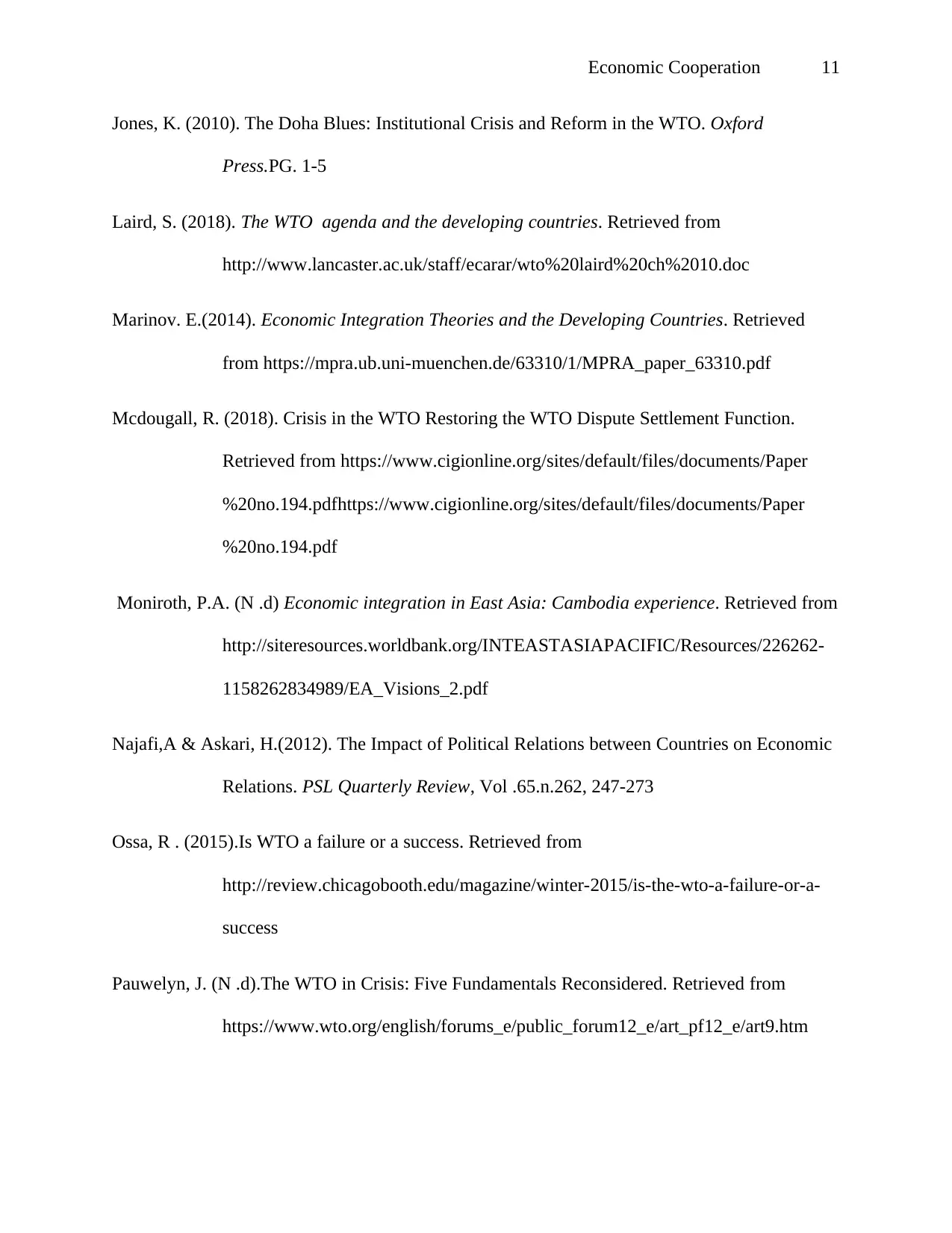
Economic Cooperation 11
Jones, K. (2010). The Doha Blues: Institutional Crisis and Reform in the WTO. Oxford
Press.PG. 1-5
Laird, S. (2018). The WTO agenda and the developing countries. Retrieved from
http://www.lancaster.ac.uk/staff/ecarar/wto%20laird%20ch%2010.doc
Marinov. E.(2014). Economic Integration Theories and the Developing Countries. Retrieved
from https://mpra.ub.uni-muenchen.de/63310/1/MPRA_paper_63310.pdf
Mcdougall, R. (2018). Crisis in the WTO Restoring the WTO Dispute Settlement Function.
Retrieved from https://www.cigionline.org/sites/default/files/documents/Paper
%20no.194.pdfhttps://www.cigionline.org/sites/default/files/documents/Paper
%20no.194.pdf
Moniroth, P.A. (N .d) Economic integration in East Asia: Cambodia experience. Retrieved from
http://siteresources.worldbank.org/INTEASTASIAPACIFIC/Resources/226262-
1158262834989/EA_Visions_2.pdf
Najafi,A & Askari, H.(2012). The Impact of Political Relations between Countries on Economic
Relations. PSL Quarterly Review, Vol .65.n.262, 247-273
Ossa, R . (2015).Is WTO a failure or a success. Retrieved from
http://review.chicagobooth.edu/magazine/winter-2015/is-the-wto-a-failure-or-a-
success
Pauwelyn, J. (N .d).The WTO in Crisis: Five Fundamentals Reconsidered. Retrieved from
https://www.wto.org/english/forums_e/public_forum12_e/art_pf12_e/art9.htm
Jones, K. (2010). The Doha Blues: Institutional Crisis and Reform in the WTO. Oxford
Press.PG. 1-5
Laird, S. (2018). The WTO agenda and the developing countries. Retrieved from
http://www.lancaster.ac.uk/staff/ecarar/wto%20laird%20ch%2010.doc
Marinov. E.(2014). Economic Integration Theories and the Developing Countries. Retrieved
from https://mpra.ub.uni-muenchen.de/63310/1/MPRA_paper_63310.pdf
Mcdougall, R. (2018). Crisis in the WTO Restoring the WTO Dispute Settlement Function.
Retrieved from https://www.cigionline.org/sites/default/files/documents/Paper
%20no.194.pdfhttps://www.cigionline.org/sites/default/files/documents/Paper
%20no.194.pdf
Moniroth, P.A. (N .d) Economic integration in East Asia: Cambodia experience. Retrieved from
http://siteresources.worldbank.org/INTEASTASIAPACIFIC/Resources/226262-
1158262834989/EA_Visions_2.pdf
Najafi,A & Askari, H.(2012). The Impact of Political Relations between Countries on Economic
Relations. PSL Quarterly Review, Vol .65.n.262, 247-273
Ossa, R . (2015).Is WTO a failure or a success. Retrieved from
http://review.chicagobooth.edu/magazine/winter-2015/is-the-wto-a-failure-or-a-
success
Pauwelyn, J. (N .d).The WTO in Crisis: Five Fundamentals Reconsidered. Retrieved from
https://www.wto.org/english/forums_e/public_forum12_e/art_pf12_e/art9.htm
⊘ This is a preview!⊘
Do you want full access?
Subscribe today to unlock all pages.

Trusted by 1+ million students worldwide
1 out of 17
Related Documents
Your All-in-One AI-Powered Toolkit for Academic Success.
+13062052269
info@desklib.com
Available 24*7 on WhatsApp / Email
![[object Object]](/_next/static/media/star-bottom.7253800d.svg)
Unlock your academic potential
Copyright © 2020–2026 A2Z Services. All Rights Reserved. Developed and managed by ZUCOL.




